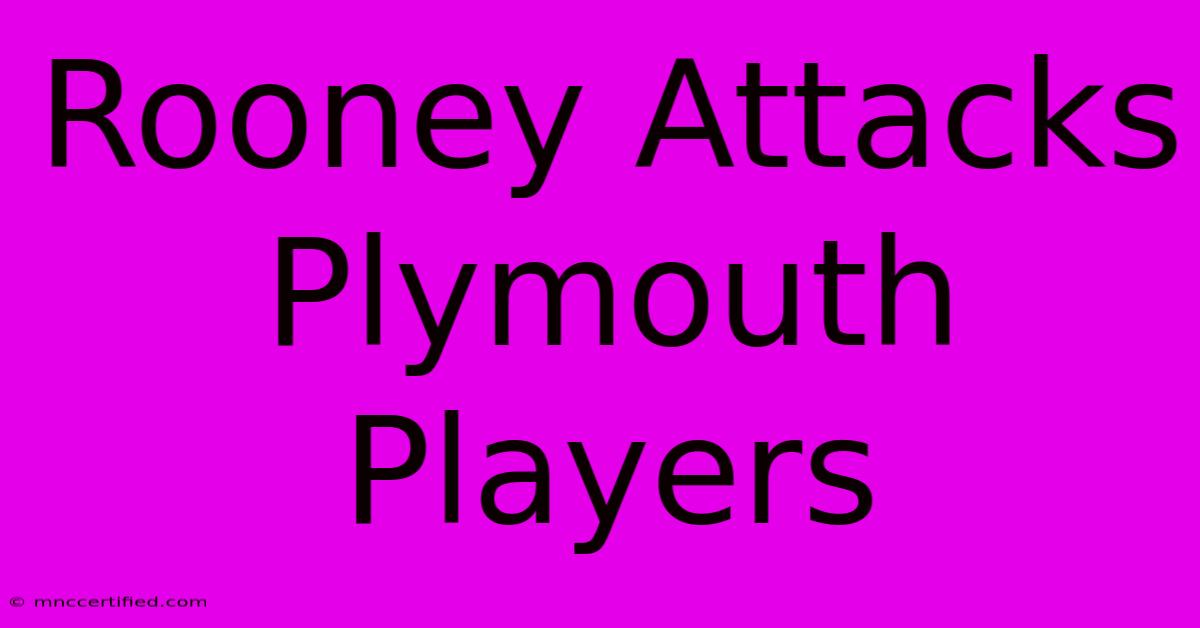Rooney Attacks Plymouth Players

Table of Contents
Rooney Attacks Plymouth Players: A Heated Encounter and its Fallout
Wayne Rooney's managerial career has been marked by passion and intensity, and a recent match against Plymouth Argyle saw that passion spill over in a controversial incident. This article delves into the details of the "Rooney attacks Plymouth players" incident, analyzing the events, the aftermath, and the broader implications for the manager and his team.
The Incident: What Happened During the Match?
The clash between Derby County (under Rooney's management at the time) and Plymouth Argyle unfolded with typical fervor. However, things took a dramatic turn during a heated exchange near the touchline. Reports vary slightly, but the core incident involved Rooney engaging in a verbal altercation with several Plymouth Argyle players, escalating to physical contact. While the exact nature of the physical contact remains debated, accounts suggest pushing and shoving were involved. The referee's response and any disciplinary actions taken are crucial parts of this narrative. Understanding the specific context surrounding the incident – the score, the game's momentum, any prior incidents involving these teams – is crucial for a complete picture.
Eyewitness Accounts and Video Evidence
Analyzing video footage and statements from various eyewitnesses is essential to fully understand the sequence of events. Many angles need to be considered to provide a fair and balanced perspective. Different perspectives from players, coaches, referees, and fans can offer a more comprehensive analysis of the events. The availability and reliability of this evidence significantly impact our understanding of who initiated the confrontation and the extent of the physicality involved.
The Aftermath: Disciplinary Actions and Public Reaction
Following the match, the footballing authorities investigated the incident. The Football Association (FA) typically reviews such incidents to determine if any rules were broken and to consider disciplinary action. The FA's decision, whether it be a fine, a suspension, or no action at all, carries significant weight, influencing public perception and setting a precedent for future similar incidents.
Media Coverage and Public Opinion
The incident generated significant media attention, with various outlets offering their own perspectives and interpretations. Public opinion was divided, with some defending Rooney's passionate style of management, while others criticized his behavior as unprofessional and unacceptable. Analyzing the range of opinions expressed online and in traditional media provides valuable insights into the broader societal reaction.
The Broader Implications: Rooney's Reputation and Management Style
This incident raises questions about Rooney's managerial approach and its potential long-term consequences. His passionate style, while often effective on the pitch, could have drawbacks if it repeatedly leads to confrontations. The incident's impact on his reputation as a manager is a critical aspect that needs careful consideration. It will be interesting to see whether this episode alters his management style or reinforces his existing approach.
Lessons Learned and Future Conduct
The "Rooney attacks Plymouth players" incident serves as a case study in managing emotions and maintaining professionalism under pressure. The event provides valuable lessons for aspiring and established managers about the importance of controlling behavior on the sidelines. Analyzing this incident can help football authorities and players learn how to de-escalate similar situations in the future.
Conclusion: A Defining Moment?
The confrontation between Wayne Rooney and Plymouth Argyle players remains a significant event in his managerial career. Its long-term consequences for both Rooney and the game remain to be seen. However, the incident highlights the complexities of managing emotions in highly charged competitive environments and underscores the importance of upholding standards of conduct within professional football. The analysis of this incident and its fallout provides a valuable lens through which to examine the pressures and responsibilities facing managers at all levels of the game.

Thank you for visiting our website wich cover about Rooney Attacks Plymouth Players. We hope the information provided has been useful to you. Feel free to contact us if you have any questions or need further assistance. See you next time and dont miss to bookmark.
Featured Posts
-
Dow Jones Trading Strategy Pdf
Nov 28, 2024
-
Bond Arms Snake Slayer Review
Nov 28, 2024
-
Storm Conall Warning Hundreds In Danger
Nov 28, 2024
-
Crazy Crow Trading Post Photos
Nov 28, 2024
-
Access Your Spotify Wrapped 2024 Release Date
Nov 28, 2024